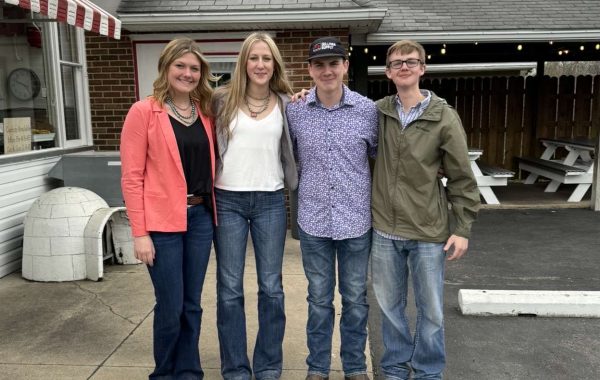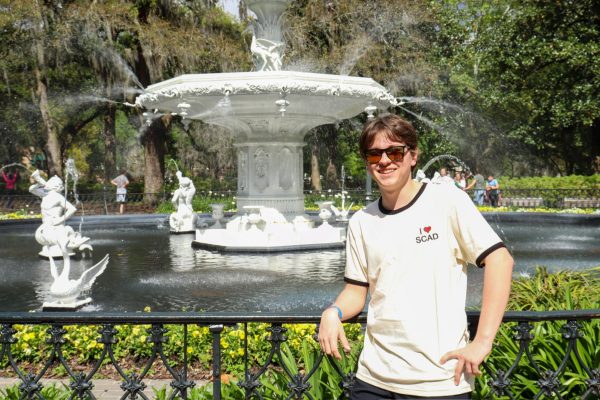Jodi Aleshire’s Regional Fountainhead Finalist Essay
This essay contest is an international competition
In life, such contrasts exist that inhabit both ends of an extreme spectrum, mortal and divine, good and evil, rationality and pragmatism. But no contrast is shown in more profound length than that of morality and success inThe Fountainhead. While conventional wisdom has always stood to reason that to achieve legitimate success, one must surrender the morals that they have used to build their very foundation, a disconnect between the truth and the assumed has fermented and grown until the belief seems to be the one consistent truth of the matter. The novel offers up a poignant view at the varying morals on an endlessly grey scale, the unbridled notion of success and the ways these characters attempt to reach that pinnacle.
Take Lois Cook, for example. Deemed a scholar, a literary genius, people treated her with an unmatched reverence. “The titles of her book were flashed in conversations like the diamonds in a speaker’s intellectual crown . . . [making it sound] as if the speaker were being very brave” (245). In a word, this can only be summarized as success. Cook had reached up higher than any skyscraper. Her fingertips brushed the clouds and her name could only seem to be spoken in haughty, lofty tones. “[They] could talk of this book to [their] friends, and if they did not understand [they] would know that [they were] superior” (237).
Her novel The Gallant Gallstone received praise each time someone spoke the name. In the words of Peter Keating, or more aptly the words of The Banner, “it’s a swell book. It’s the product of a scintillating brain, a Puck with tears streaming down his face, a golden-hearted clown holding for a moment the throne of God” (435). Is this not success? Her novel constantly being given the highest of praise, her name known by every man, woman, and child in America, Lois Cook was a successful writer. Yet, to reach this success, she surrendered her morals at the hands of Ellsworth Toohey. Cook traded her ethics for the number one slot on the bestseller list. In the words of Cook herself, “[and] a worse piece of trash never was put down on paper. I ought to know” (489). The book was absurd, a piece of tripe, “just a lot of drivel” (409). Her morals were thrown away; they were unpractical, unneeded, unwanted in the search for success.
Peter Keating was no different, a man with morals surrendered in the pursuit of success. Pushed into architecture by his mother, he gave up his moral standing when he turned over his dreams: (“It’s funny, Keating remembered, at one time he had wanted to be an artist.”) (20). Keating was a second-hander, “mediocre, but. . . great in the eyes of others . . . the man whose sole desire is to make money” (633). His success came at the behest of others. Of Roark, of Francon, of Stengel, of Heyer, his success came from the climbing he did upon those who crossed his path.
Look at Keating’s relationship with Tim Davis, his “best friend,” the newlywed, the best draftsmen at Francon & Heyer, his career was reduced to little more than a pile of rubble at the greedy hands of Peter Keating. To reach the pinnacle of success, Keating became the type of immoral man Ayn Rand so vehemently wrote against. The ruined career was little more than a footnote in Keating’s mind, a warm type of pleasure at the recollection of a damaged career (58). Keating knew little of the world he had plunged himself into. His thoughts were the thoughts of those whose careers preceded his, of the great architects long since rotting below the earth. Selfish and mindless, Keating allowed himself to do whatever he felt was necessary to climb higher, to reach further, until he reached the epitome of success. But the cost of his success was more than simply blood, sweat, and tears. He gave up the love of a woman who clung to him throughout his cruelty; he gave up the sense of pride that came with watching a building spring from a sketch to a physical monument of his own ingenuity; he gave up his childhood dreams of artistry; he gave up the friendship of men who tried to care for him; he gave up his morality.
When he took the contract with Francon & Heyer fresh out of Stanton in ‘22, he began travelling down a dangerous path. He held true to his standards for a short period of time, refusing to see Toohey, trying to do his own work, but that phase lasted little. When he fell prey to Toohey, he signed a deal with the devil at the cost of his soul; “[he] obeyed [him] in the name of ideals. [He’ll] go on obeying [him] without ideals. Because that’s all [he’s] good for now” (670). When the novel came to a close, Keating was a broken man, alone, with a failed career and an empty bed. The success he had given everything for ended in nothing but what-once-was’s and what-could-have-been’s.
But the novel does not simply speak of the immoral and unjust, but of the idealistic who hold true to their beliefs at the risk of everything else. Sitting as the foil for Lois Cook resides Henry Cameron. Cameron clung to his ideals like a drowning man to a buoy. Standing out amongst the towering buildings of Renaissance and Gothicism, the Dana Building was the soft hymn to the morals and individualism of a man ahead of his time, drowned out by the raucous cries of the many. Deemed a failure, a laughingstock, “a bum and a drunkard,” his work was brushed aside (13).
His fame and success a candle, when the wind of change came once again and puffed out the flame, he held steadfast and continued in his pursuit of originality and truth through his work. He had nothing to offer up in comparison to the centuries of culture sprawled behind and before him in the new expanse of structures which consumed city after city, “nothing but the faith he held merely because it was his own. He had nobody to quote and nothing of importance to say. . . he wished to build as he wished and for that reason only” (34, 35). Cameron knew that his truth was not the truth accepted by the masses; he knew but he let his ideals take the reins from his hands. A man is nothing if not prone to the glint of gold, yet he is everything once he surrenders his morality. This was a truth, widely accepted as it was, that Cameron refused to acknowledge. A lie disguised as a truth, Cameron knew this while no one else of his time did.
He was not Lois Cook, who sold her soul for a few pieces of silver, a hint of reverie following her name, a hatred of the work that sunk bone deep. Henry Cameron kept his soul, but let it drown in cheap liquor; his name was spoken with a scoff as if it left a bad taste in the speaker’s mouth; he loved his work, and for it he fought, and for it he lost (35). An idealist, a moral man, he was left penniless and unsuccessful in the eyes of the world, in the eyes of everyone- except for Howard Roark.
For every Cook, there will be a Cameron, and for every Keating, a Roark. Howard Roark, while unpleasant to most everyone, had morals. He knew what he believed, he knew success was not something that would come with an open hand and a beckoning smile from those around him. He knew he would have to claw with bloodied hands to make “anything” of himself, yet, he cared little. Success of the world’s definition was a trivial matter to Howard Roark. He did not wish to dwell in the past, no more than Henry Cameron wished (10). He was not idealistic in his pursuits, all he wished was to build, and by building, he wished for the truth. He did not believe in superfluity, in excess, in the gluttony of Roman facades and Greek columns. If he placed a piece into a building, the building would be nothing without it (132).
Roark did not allow his morals to be traded in for practical success in the eyes of his peers. He failed, was berated, broken down and made a fool, yet he refused to succumb. The Stoddard Temple, a building he let flood with his spirit, became a symbol for what everyone around him deemed his mediocrity, his sacrilege to the idea of religion and humanity itself, but he kept silent and kept pencil to draft paper (349).
When the novel came to a close, Lois Cook’s career was ending- no more would Toohey pull her strings; Peter Keating was a broken shell of what he once was, his career in shambles at his feet; Henry Cameron was dead, his career having died long before he did himself; Howard Roark stood atop the Wynand Building with the love of his life, overlooking the world he helped, and would help, shape. The moral man, the practical man, the ideal man, his success was the only true definition of success within the entirety of The Fountainhead. He reached the pinnacle of success, a peak sought after by many, and he did so by ignoring the cries from those around him, by ignoring the siren song of false success, by keeping true to the morality that ran in his veins. And by that alone, Howard Roark was successful.










